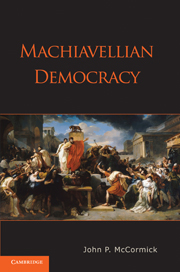6 - Republicanism and Democracy
Published online by Cambridge University Press: 05 June 2012
Summary
In Rome, a tribune, or any citizen, could propose laws, on which every citizen could speak…so that ultimately the people might choose what was best.
Machiavelli, Discourses I.18The people are too ignorant to discuss important matters freely and ably in assembly.…Magistrates alone should choose speakers and topics.
Guicciardini, Considerations I.2Democrats should worry when philosophers employ the language of “republicanism.” When philosophers espouse purportedly objective principles, such as the common good, the rule of law, depoliticization – that is, normative standards that they claim will make democracy operate more justly – democrats should be very worried indeed. History teaches that this discourse of republicanism – of a common good not fully achievable through extensive popular participation and ultimate majority judgment – enjoys a rather dubious legacy. Republicanism, historically, often prompted aristocratic coups against popular governments or justified oligarchic consolidation once more democratic regimes had been overthrown. On principle, neither of these outcomes is necessarily problematic for contemporary adherents of republicanism; after all, as I discuss in what follows, they value popular participation much less than they do policy outcomes that supposedly benefit the populace at large or track the common good. Minimal or, at best, indirect authorization and distended contestation of elite governance by common citizens, they suppose, is sufficient to promote and protect the people's liberty.
Looking back over time, dominant strands of “republican” theory and practice – from Aristotle to Guicciardini to Madison, from Sparta to Venice to the American Founding – have empowered economic and political elites over common citizens and insulated the former from the latter's reach.
- Type
- Chapter
- Information
- Machiavellian Democracy , pp. 141 - 169Publisher: Cambridge University PressPrint publication year: 2011

